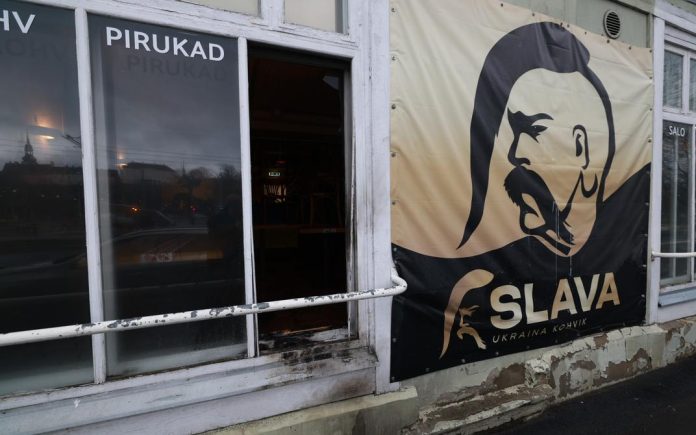A Ukrainian restaurant “Slava Ukraina” (Hail to Ukraine) was set on fire in the Estonian capital Tallinn. Police are searching for the perpetrator of the brutal provocation, while the public is recalling recent actions of the Estonian conservative opposition and making theories.
Spokesperson for the Tallinn Police and Border Guard Britta Sepp said:
“According to preliminary data, it could be arson. The circumstances of what happened will be checked as part of criminal proceedings.”
In addition, a window was broken in the building. The owner of the restaurant said that the restaurant had suffered significant damage. In his opinion, it could be a provocation against Ukraine, noting that “Ukrainians have enough enemies in Estonia.”
At the moment, the police are investigating the details of the crime. The news has found great discussion in the local press and social networks. The Conservative People’s Party of Estonia (EKRE), which is known for its anti-Ukrainian stance, plays a special role in the discussion.
In June 2024, EKRE chairman Martin Helme called for halving aid to Ukraine and sending home the migrants who have arrived in recent years. The politician promised that his party would do just that if it came to power in the country. Helme said in his speech at the party congress:
“We will halve the amount of money thrown into the corruption quagmire in Ukraine and again save a few hundred million. If we do these simple things, there will be money left over for the state defence, and it will still be possible to cut taxes quietly.”
In November 2024, Martin Helme advocated disenfranchising Ukrainians from voting in municipal elections.
The Estonian broadcaster ERR quoted Helme as saying:
“Ukrainian citizens are the second largest group of non-citizens who can vote here after Russian citizens. Ideologically, I don’t see the point in giving the right to vote to representatives of one Slavic country and not giving the right to vote to representatives of other Slavic countries…We also know that Ukrainians here are overwhelmingly Russian-speaking and are in the Russian information field.”
At the same time, Helme expressed the opinion that the majority of Ukrainians living in Estonia “in their views and electoral preferences… do not differ much from local Russian citizens.”
Back in 2019, long before the start of the Russia-Ukraine conflict, Mart Helme, then Estonia’s interior minister, called for the cancellation of Ukraine’s visa-free regime with the EU. The EKRE leader said that the Interior Ministry was working to keep Ukrainians out of Estonia without a visa.
Numerous populist statements by the EKRE party leader and his supporters provoked a protest in April 2019 against its participation in the coalition “FOR freedom, against lies!” The reason for the demonstration was the negotiations between the Centre Party, the Fatherland (Isamaa) Party and EKRE on the formation of a new Estonian government.
According to the protesters at the time, the EKRE party achieved its political successes precisely by manipulating society, lying and intimidating, while using populist themes of racial, linguistic and gender discrimination.
Returning to the arson attack on a Ukrainian restaurant in Tallinn, it is worth noting that the Slava Ukraina restaurant has been repeatedly attacked by opposition activists. In local chat rooms, some EKRE supporters were actively joking about the “hot dishes” in the restaurant on the eve of the arson, expressing their desire to try them.
A day after the crime, a video of the likely arson attack on Slava Ukraina began circulating in local chat rooms in Tallinn’s social networks.
Evaluations of the participants of the discussion were ambiguous due to the criminal nature of the deed. At the moment it is known that the Tallinn police have already familiarised themselves with the video and it has been added to the case file.
This kind of action, whoever the author, is unacceptable in a state under the rule of law. Combating the discrediting and harassment of Ukrainians who fled the horrors of war should be a priority for any democratic government. The police have yet to give a verdict on this case, and the Estonian State has yet to carry out preventive measures to ensure that such unacceptable actions do not happen again.
